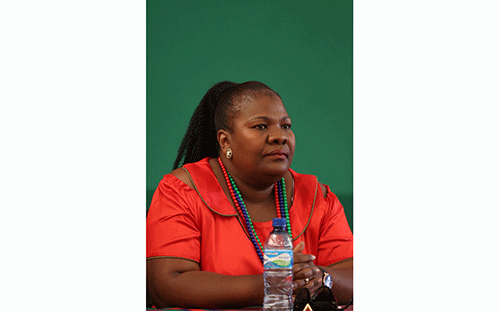The dust around Swapo’s contentious seventh elective congress refuses to settle almost two weeks after it came to an end.
Parliamentarian Evelyn !Nawases-Taeyele, who lost out on Swapo’s deputy secretary general position, due to the party’s 50/50 gender policy has challenged the decision to eliminate her from the second round of elections after scoring the second highest in the first round.
Uahekua Herunga had garnered 363 of the votes, while !Nawases-Taeyele received 326 votes.
David Hamutenya only managed to get 92 votes but the re-run was called between the two male candidates. Congress returning officer Joshua Kaumbi had earlier ruled out !Nawases-Taeyele in the second round, citing the party’s policy on gender representation.
Former tourism minister Herunga won the re-run against Hamutenya. Herunga received 414 votes, while Hamutenya got 168. “In terms of the rules and procedures of the Swapo party, a person can only be declared a winner if you have 51% of the votes.
Unfortunately, all three candidates did not obtain 51%,” !Nawases-Taeyele said yesterday through her lawyers Metcalfe Beukes Attorneys, who wrote to Swapo secretary general Sophia Shaningwa.
She said the party constitution says the top four should consist of at least two males and two females.
“The rules say you should get 51% to be declared the winner. Guided by the rules, we have resolved that Herunga and Hamutenya will go for a rerun until one of them have 51% in line with the party rules and constitution.”
According to her lawyers, as a result of the returning officer’s “erroneous interpretation of Article 11 (16) of the party’s constitution”, the rerun took place between the two male candidates, with Herunga emerging victorious. “Our client is naturally disgruntled by the unjust and discriminatory treatment she endured, which treatment we now contest.
Our client is entitled to demand the fulfilment of what is established in the constitution, to put forward proposals and defend her opinions before a decision is reached on a matter, and to receive concrete and timely answers to her queries, which rights are conferred by Swapo’s constitution.
(Article 10.1. (a), (c) and (g)),” reads the letter to Shaningwa yesterday. According to the lawyers, !Nawases-Taeyele’s right to compliance with the audi alteram partem (listen to the other side) principle was blatantly disregarded when the resolution was made that she shall be omitted from the rerun on the basis of gender.
Quoting the Swapo constitution and the rules for the election of office bearers, !Nawases-Taeyele’s lawyers said of the three candidates who will contest the positions of president, vice president, secretary-general and deputy secretary-general, at least one such candidate must be a woman. “The congress shall elect officials provided that during the election of the president, the vice president, the secretary general and the deputy secretary general, the congress shall ensure that two of such positions are held by women. Article 11 (16),” the lawyers said.
“A candidate shall be required to obtain at least 51% of the votes cast, to be declared duly elected by the returning officer, (Rule 34 (4) read with rule 39 (11).” The lawyers said when after the first round of voting no candidate obtained 51% of the votes cast, the first two candidates who obtained the highest votes shall qualify for the second round.
“In conflict of Rule 39 (12), the candidate who obtained the highest votes, comrade Herunga (46%) and the candidate with the lowest vote, comrade Hamutenya (12%) qualified for the second round,” reads the lawyer’s letter. According to the lawyers, the interpretation of the relevant constitutional provisions and the rules were misinterpreted by Kaumbi and the election committee as they failed to give effect to the intended purpose of the drafters in consideration of the constitutional dispensation.
Legal expert John Nakuta said yesterday that situations like these always occur when decisions are taken on the basis of a misinterpretation of an empowering provision or law.
“This is a classical example of an error of law (mistake of law). In this case, the law is the Swapo Constitution and the Rules for Election of Office Bearers.”
“Rule 9 was clearly misinterpreted.” One female candidate serves as the peremptory floor, not the ceiling. It makes room for a scenario where all four top positions might be occupied by women. “It is my considered view that the presiding officer and his team misinterpreted rule nine,” he said, adding that in the same vein, the runoff did not occur in accordance with the tenets of the party’s governing rules. He said it was supposed to happen between the two top candidates but the whole fiasco is further complicated by the fact that the presiding officer and/or the party cannot now willy-nilly revoke the outcome of the DSG position.
The presiding officer is now functus officio in law (he performed his function). In law, even glaring invalid decision produce legal consequences, he added.
He said all decisions are presumed to have been valid until declared invalid by a competent court.
“What him and the party should do is to apply to the High Court to have this decision declared invalid, set aside, and remitted to them to self correct,” he said.
– ktjitemisa@nepc.com.na



